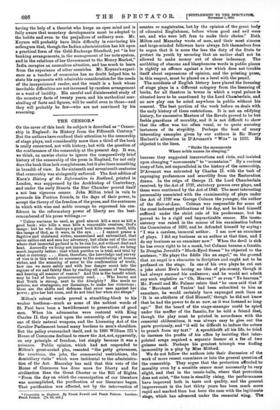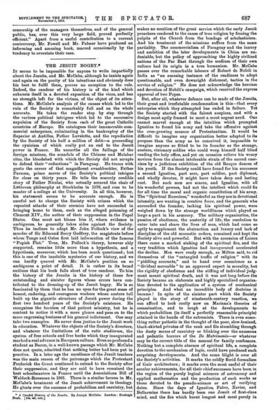THE CENSOR.* ON the cover of this book its subject
is described as "Censor- ship in England : its History from the Fifteenth Century."
But the authors have confined their attention to the censorship of stage plays, and considerably more than a third of the book is really concerned, not with history, but with the question of the continuance of the censorship at the present day. It was, we think, an unwise choice to ignore the comparatively brief
history of the censorship of the press in England, for not only does the book thus lack completeness, but it also loses something in breadth of view. In the sixteenth and seventeenth centuries that censorship was stringently enforced. The first edition of Knox's History of the Reformation in Scotland, printed in
London, was suppressed by the Archbishop of Canterbury, and under the early Stuarts the Star Chamber proved itself a not less vigorous censor. John Milton tried in vain to persuade his Puritan friends, in the days of their power, to accept the theory of the freedom of the press, and the sentences in which with wise and noble courage he expressed his con- fidence in the reformatory power of liberty are the best. remembered of his prose writings :—
"Unless wariness be used, as good almost kill a man as kill a good book : who kills a man kills a reasonable creature, God's image : but he who destroys a good book kills reason itself, kills the image of God, as it were, in the eye. . . . I cannot praise a fugitive and cloistered virtue, unexercised and nnbreathed, that never sallies out and sees her adversary, but slinks out of the race where that immortal garland is to be run for, not without dust and heat. Assuredly we bring not innocence into the world ; we bring much impurity rather : that which purifies us is trial, and trial by what is contrary. . . . Since, therefore, the knowledge and survey of vice is in this world so necessary to the constituting of human virtue, and the scanning of error to the confirmation of truth, how can we more safely and with less danger scout into the regions of sin and falsity than by reading all manner of tractates, and hearing all manner of reason? And this is the benefit which may be had of books promiscuously read. . . . Who knows not that Truth is strong, next to the Almighty ? She needs no policies, nor stratagems, nor licensings, to make her victorious ; those are the shifts and defences that error uses against her power ; give her but room, and do not bind her when she sleeps."
Milton's robust words proved a stumbling-block to his weaker brethren—much as some of the noblest words of St. Paul have been a bewilderment to generations of good men. When his adversaries were restored with King Charles II. they seized upon the censorship of the press as one of their natural weapons, and the Licensing Act of the Cavalier Parliament bound many burdens to men's shoulders.
But the policy overreached itself, and in 1695 William la's House of Commons declined to renew the Act, not, apparently, on any principle of freedom, but simply because it was a nuisance. Public opinion, which had not responded to Milton's great-souled plea, resented "the petty grievances, the exactions, the jobs, the commercial restrictions, the domiciliary visits" which were incidental to the administra- tion of the Act. Macaulay has said that this vote of the House of Commons has done more for liberty and for civilisation than the Great Charter or the Bill of Rights.
"From the day on which the emancipation of our literature was accomplished, the purification of our literature began. That purification was effected, not by the intervention of
• Censorship in England. By Frank Foivell and Frank Palmer. London: Frank Palmer. rs. Bd. net.j
senates or magistrates, but by the opinion of the great body of educated Englishmen, before whom good and evil were set, and who were left free to make their choice." Both Milton and Macaulay wrote of men, and their most sincere and large-minded followers have always felt themselves free to argue that it is none the less the duty of the State to protect its youth by securing that an author shall not be allowed to make money out of sheer indecency. The scribbling of obscene and blasphemous words in public places is rightly an offence against a law which does not trouble itself about expressions of opinion, and the printing press, in this respect, must be placed on a level with the pencil.
The accidents of English history have placed the licensing of stage plays in a different category from the licensing of books, for all theatres in towns in which a royal palace is situated have to be sanctioned by the Lord Chamberlain, and no new play can be acted anywhere in public without his consent. The best portion of the work before us deals with the early history of these restrictions. It is not an edifying history, for successive Masters of the Revels proved to be but feeble guardians of morality, and it is not difficult to show that the office was too often venal, or to quote amusing instances of its stupidity. Perhaps the best of many interesting examples given by our authors is Sir Henry Herbert's alteration in D'Avenant's " Wits " in 1633. He objected to the lines,
"Strike the monuments
Where noble names lie sleeping."
because they suggested insurrections and riots, and insisted upon changing "monuments" to "mountains." By a curious irony of fate, not unparalleled in the history of the censorship, D'Avenant was entrusted by Charles II. with the task of expunging profaneness and scurrility from the Restoration drama. In the reign of George II. the Lord Chamberlain received, by the Act of 1737, statutory powers over plays, and these were continued by the Act of 1843. The most interesting personality associated with the examinership of plays under the Act of 1737 was George Colman the younger, the author of the Heir-at-Law. Colman was responsible for some of the most indecent publications of his day, and he had himself suffered under the strict rule of his predecessor, but he proved to be a rigid and impracticable censor. His incon. sistency was raised in the course of his examination before the Commission of 1832, and he defended himself by saying : "I was a careless, immoral author. I am now an examiner of plays. I did my business as an author at that time, and I do my business as an examiner now." When the devil is sick he has every right to be a monk, but Colman became a fanatic. In Douglas Jerrold's "Black-Eyed Susan" he objected to the sentence, "He plays the fiddle like an angel," on the ground that an angel is a character in Scripture and ought not to be profaned on the stage. In one of his own plays he cut out a joke about Eve's having no idea of pin-money, though it had always amused his audiences ; and he would not admit any such expletive as" Oh, Heaven !" or even " Ye heavens." Mr. Fowell and Mr. Palmer relate that "he once said that if the 'Merchant of Venice' had been submitted to him as examiner, he would certainly have expunged such lines as It is an attribute of God Himself,' though he did not know that he bad the power to do so now, as it was licensed so long ago." But the beard of the stage-manager could be spied under the muffler of the fanatic, for be told a friend that, though the play must be printed in accordance with the censorial obliterations, it was always easy to give out the parts previously, and "it will be difficult to induce the actors to preach from my text." A spendthrift all his life, he tried to increase the profits of his office by insisting that inter. polated songs required a separate licence at a fee of two guineas each. Perhaps his greatest triumph was finding immorality in a play by Miss Mitford.
We do not follow the authors into their discussion of the work of more recent examiners or into the general question of the censorship. They argue that the protection afforded to morality even by a sensible censor must necessarily be very slight, and that in the music-halls, where that protection does not exist, "the tone is steadily rising, the performances have improved both in taste and quality, and the general improvement in the last thirty years has been much more rapid and marked than has been the case with the legitimate stage, which has advanced under the censorial wing. The censorship of the managers themselves, and of the general public, has, over this very large field, proved perfectly efficient." Apart from a useful contribution to a current controversy, Mr. Fowell and Mr. Palmer have produced an informing and amusing book, marred occasionally by the tendency to overstate their case.































































 Previous page
Previous page